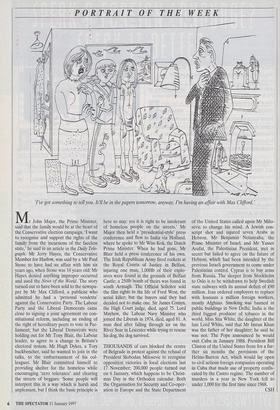PORTRAIT OF THE WEEK
'I've got something to tell you. It'll be in the papers tomorrow, anyway, I'm having an affair with Max Clifford.'
Mr John Major, the Prime Minister, said that the family would be at the heart of the Conservative election campaign. 'I want to recognise and support the rights of the family from the incursions of the faceless state,' he said in an article in the Daily Tele- graph. Mr Jerry Hayes, the Conservative Member for Harlow, was said by a Mr Paul Stone to have had an affair with him six years ago, when Stone was 18 years old; Mr Hayes denied anything improper occurred and sued the News of the World. The story turned out to have been sold to the newspa- per by Mr Max Clifford, a publicist who admitted he had a 'personal vendetta' against the Conservative Party. The Labour Party and the Liberal Democrats came close to signing a joint agreement on con- stitutional reform, including an ending of the right of hereditary peers to vote in Par- liament; but the Liberal Democrats were holding out for Mr Tony Blair, the Labour leader, to agree to a change in Britain's electoral system. Mr Hugh Dykes, a Tory backbencher, said he wanted to join in the talks, to the embarrassment of his col- leagues. Mr Blair committed himself to providing shelter for the homeless while encouraging 'zero tolerance' and clearing the streets of beggars: 'Some people will interpret this in a way which is harsh and unpleasant, but I think the basic principle is here to stay: yes it is right to be intolerant of homeless people on the streets.' Mr Major then held a 'presidential-style press conference and flew to India via Holland, where he spoke to Mr Wim Kok, the Dutch Prime Minister. When he had gone, Mr Blair held a press conference of his own. The Irish Republican Army fired rockets at the Royal Courts of Justice in Belfast, injuring one man; 1,0001b of their explo- sives were found in the grounds of Belfast Castle; a 2501b bomb of theirs was found in south Armagh. The Official Solicitor sold the film rights to the life of Fred West, the serial killer; but the buyers said they had decided not to make one. Sir James Comyn, the High Court judge, died, aged 75. Lord Mayhew, the Labour Navy Minister who joined the Liberals in 1974, died, aged 81. A man died after falling through ice on the River Soar in Leicester while trying to rescue his dog; the dog survived.
THOUSANDS of cars blocked the centre of Belgrade in protest against the refusal of President Slobodan Milosevic to recognise opposition victories in local elections last 17 November; 200,000 people turned out on 6 January, which happens to be Christ- mas Day in the Orthodox calendar. Both the Organisation for Security and Co-oper- ation in Europe and the State Department of the United States called upon Mr Milo- sevic to change his mind. A Jewish con- script shot and injured seven Arabs in Hebron. Mr Benjamin Netanyahu, the Prime Minister of Israel, and Mr Yasser Arafat, the Palestinian President, met in secret but failed to agree on the future of Hebron, which had been intended by the previous Israeli government to come under Palestinian control. Cyprus is to buy arms from Russia. The sleeper from Stockholm to Oslo is to be withdrawn to help Swedish state railways with its annual deficit of £90 million. Iran ordered employers to replace with Iranians a million foreign workers, mostly Afghans. Smoking was banned in public buildings in New Delhi; India is the third biggest producer of tobacco in the world. Miss Sita White, the daughter of the late Lord White, said that Mr Imran Khan was the father of her daughter; he said he was not. The Pope announced he would visit Cuba in January 1988. President Bill Clinton of the United States froze for a fur- ther six months the provisions of the Helms-Burton Act, which would lay open to civil actions foreign companies operating in Cuba that made use of property confis- cated by the Castro regime. The number of murders in a year in New York fell to under 1,000 for the first time since 1968.
CSH































 Previous page
Previous page